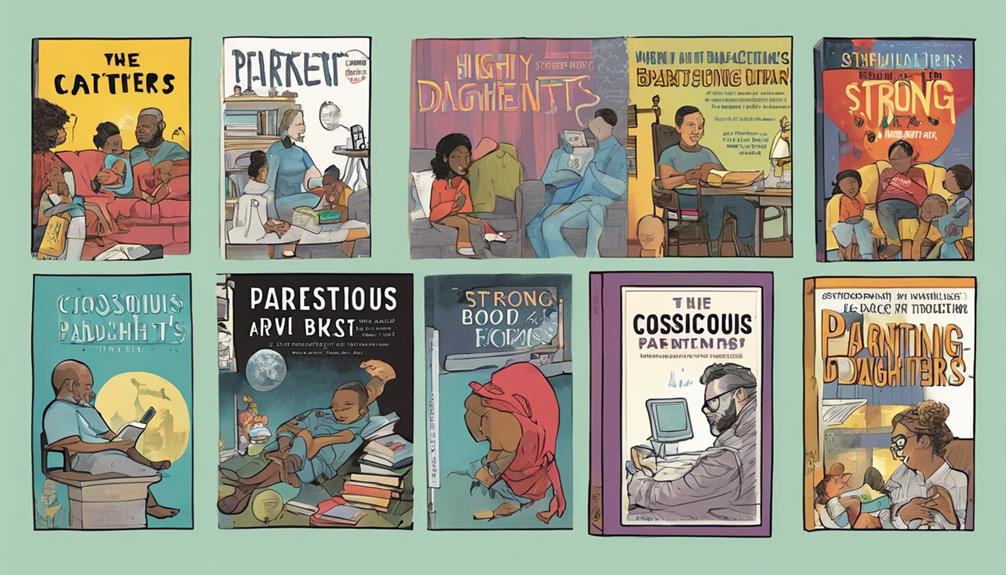Exploring books on emotional intelligence reveals cool ways to help kids grow up well-rounded. **Books like** 'Building Emotional Intelligence' feature fun exercises for emotions, though the format can be tricky. 'The Whole-Brain Child' provides amazing tips from kids’ therapists on understanding feelings and actions. Reading 'Teach Your Kids Emotional Intelligence' offers parents good tools to manage emotions, ideal for sensitive kids. **Emotional growth** enables parents to communicate and discipline better. Exploring these resources uncovers awesome tips for boosting kids’ emotional intelligence.
Key Takeaways
- Practical exercises and techniques for emotional development in children.
- Positive feedback and recommendations from experts and parents.
- Strategies tailored for different age groups and specific audiences.
- Author expertise and qualifications in emotional intelligence and parenting.
- Impactful techniques with proven effectiveness in enhancing emotional intelligence skills.
Building Emotional Intelligence: Practices to Cultivate Inner Resilience in Children

For parents seeking practical guidance on fostering emotional intelligence in their children, the book 'Building Emotional Intelligence: Practices to Cultivate Inner Resilience in Children' offers valuable insights and techniques.
This book emphasizes the significant role emotional intelligence plays in shaping a child's behavior, particularly in the formative years. It provides practical exercises and strategies that cater to parents, teachers, and counselors, making it a versatile resource for anyone involved in a child's emotional development.
Positive reviews highlight the effectiveness of the book in promoting emotional intelligence and inner strength in children. While some readers note the absence of a CD in the Kindle edition as a drawback, the overall impact of the book on children is seen as highly beneficial by educators and caregivers.
Best For: Parents, teachers, and counselors seeking practical guidance on fostering emotional intelligence in children.
Pros:
- Practical exercises and techniques cater to various individuals involved in a child's emotional development.
- Positive reviews highlight the effectiveness of promoting emotional intelligence and inner strength in children.
- Valuable insights for understanding and implementing emotional intelligence skills in children.
Cons:
- Lack of a CD in the Kindle edition may be seen as a drawback by some readers.
- Format or content dissatisfaction reported by some readers.
- Some readers may find the book's information repetitive or not sufficiently in-depth.
Raising Emotional Intelligence in Kids

Parenting Books for Emotional Intelligence are ideal for parents seeking effective strategies to cultivate their children's emotional intelligence from a young age. As kids aren't born with the knowledge of managing emotions, it becomes essential for parents to teach them how to process feelings effectively.
This emotional intelligence is essential for children to grow into successful and mature adults. The book on raising emotional intelligence in kids has received positive feedback from readers, educators, and parents alike. It offers practical tips and strategies that can be implemented immediately, making it a valuable resource for nurturing emotional well-being in children.
The impact of the book is evident in the excitement among soon-to-be parents to apply the information and in the recognition of the importance of emotional intelligence in children's development. Overall, this resource is considered a game-changer for parents and caregivers, empowering them to effectively nurture children's emotional well-being and create a supportive environment for emotional growth.
Best For: Parents and caregivers looking to effectively nurture their children's emotional intelligence and well-being.
Pros:
- Practical tips and strategies that can be implemented immediately.
- Positive feedback from readers, educators, and parents.
- Valuable resource for nurturing emotional well-being in children.
Cons:
- Might require consistent effort and time commitment from parents.
- Specific strategies may not work for every child.
- Limited focus on addressing challenges or setbacks in emotional development.
The Whole-Brain Child: 12 Revolutionary Strategies to Nurture Your Child's Developing Mind

Transformative and practical, 'The Whole-Brain Child' offers valuable insights into understanding and nurturing a child's developing mind. This book has had a significant impact on many parents, providing a deeper understanding of how a child's brain functions, their emotions, and behaviors.
Parents have reported positive changes in their parenting approaches and interactions with their children after implementing the strategies outlined in the book. Professionals in the field, including pediatric therapists, recommend this book for its accessible language and practical techniques.
'The Whole-Brain Child' translates complex neurobiology concepts into easy-to-understand information, offering 12 strategies that link behavior to brain development. While some readers note that the book may cater more to certain demographics and implementing the strategies can be challenging, it remains a valuable resource for parents looking to enhance their parenting skills.
Best For: Parents seeking practical strategies to enhance their understanding of child development and improve their parenting interactions.
Pros:
- Provides valuable insights into a child's brain, emotions, and behaviors.
- Offers practical techniques with reported immediate positive results.
- Recommended by pediatric therapists and commended for its approachable language.
Cons:
- Some readers find the content tailored more towards specific demographics.
- Implementing strategies may require significant effort and mindset changes.
- Not fully addressing challenging situations or children with specific needs.
Teach Your Kids Emotional Intelligence: Without Losing Your Own

Discover practical tools and techniques in 'Teach Your Kids Emotional Intelligence: Without Losing Your Own' designed to help families navigate and improve emotional understanding. This workbook has garnered positive reviews for its unique approach to emotional intelligence, offering more than just theoretical knowledge.
It serves as a valuable resource for both families and individuals, providing activities and techniques that prove beneficial in helping children comprehend and process their emotions effectively. The workbook's practical benefits include tools for managing emotions, with pages that can be used multiple times. Users have reported that lessons from the workbook resonate well with emotionally sensitive children, aiding in enhancing self-awareness and emotional comprehension.
Personal experiences highlight the positive impact on parenting dynamics, with many expressing regret for not discovering this resource sooner and excitement to incorporate its teachings into family life. With high praise for the author's expertise, many look forward to the long-term benefits the workbook offers in improving relationships and family dynamics for the future.
Best For: Families seeking practical tools to enhance emotional intelligence and understanding within their dynamics.
Pros:
- Provides practical tools and techniques for managing emotions.
- Workbook pages can be reused for ongoing practice and learning.
- Resonates well with emotionally sensitive children, aiding in self-awareness and emotional comprehension.
Cons:
- Limited insight into potential challenges or difficulties that may arise during implementation.
- May require consistent effort and commitment from all family members to see significant results.
- Some users may find the workbook's approach to emotional intelligence to be too simplistic or basic.
Emotional Intelligence: Why It Can Matter More Than IQ

When prioritizing the development of emotional intelligence over traditional intelligence in raising children, understanding the significance of emotional literacy becomes crucial for caregivers.
Emotional intelligence (E.I.) encompasses the ability to recognize, comprehend, and manage emotions within oneself and others. This includes internal skills like self-awareness and self-regulation, as well as external competencies such as empathy and social awareness.
Emotions are intricately linked to neural processes in the brain, with structures like the amygdala and prefrontal cortex playing essential roles. Managing emotions effectively can enhance motivation and resilience, while negative emotional states like anger and anxiety can hinder cognitive functions.
Ultimately, emotional intelligence can have a profound impact on relationships, work performance, and overall well-being, often surpassing the influence of traditional intelligence (IQ) in various aspects of life.
Best For: Parents and caregivers looking to prioritize emotional intelligence development in children.
Pros:
- Enhances ability to recognize and manage emotions effectively.
- Improves motivation and resilience.
- Fosters empathy and social awareness skills.
Cons:
- Requires consistent effort and practice.
- May be challenging to implement in certain environments.
- Not a quick fix solution for emotional challenges.
Raising Good Humans: A Mindful Guide to Breaking the Cycle of Reactive Parenting

For parents seeking practical strategies to enhance their communication skills and break free from reactive parenting patterns, 'Raising Good Humans: A Mindful Guide to Breaking the Cycle of Reactive Parenting' offers valuable insights and guidance. This book presents information in an engaging manner, providing readers with practical strategies for effective communication with their children.
It emphasizes the importance of mindfulness practices, including meditation, in parenting. While some may find the focus on meditation challenging initially, many acknowledge its benefits once they grasp its importance. Readers appreciate the book's emphasis on self-work and unlearning past parenting practices to become more mindful parents.
Personal experiences shared by readers highlight the book's transformative impact, helping individuals identify triggers and work through underlying issues affecting their parenting. Overall, 'Raising Good Humans' is highly recommended for all parents, especially those looking to improve their parenting skills and create a positive impact on their children.
Best For: Parents looking to enhance their communication skills, break free from reactive parenting patterns, and incorporate mindfulness practices into their parenting approach.
Pros:
- Valuable insights and practical strategies for effective communication with children.
- Emphasis on mindfulness practices, including meditation, to promote mindful parenting.
- Transformative impact on readers by helping them identify triggers and work through underlying issues affecting their parenting.
Cons:
- Some may find the focus on meditation challenging initially.
- Requires effort to unlearn past parenting practices and engage in self-work.
- Not suitable for those not open to incorporating mindfulness into their parenting style.
Raising an Emotionally Intelligent Child: The Heart of Parenting

The 'Parenting Books for Emotional Intelligence' is a valuable resource for parents seeking to nurture their child's emotional intelligence and enhance their family dynamics. Understanding the importance of emotional intelligence in parenting is key to raising well-rounded individuals.
Emotionally intelligent children tend to have better relationships, improved academic performance, and stronger social skills. Parents play a significant role in shaping their children's emotional health, with different parenting styles influencing their emotional development.
The book emphasizes the significance of emotional connectedness within the family unit, as it forms the basis for instilling values and raising morally sound individuals. Practical advice, such as emotion coaching and effective communication techniques, is provided to help parents navigate challenging situations and foster a supportive environment for their child's emotional growth.
By reading this book, parents can enhance their parenting skills and positively impact their children's emotional well-being.
Best For: Parents who want to improve their parenting skills and enhance their child's emotional intelligence.
Pros:
- Provides practical examples and guidance for dealing with challenging situations in a child's life.
- Emphasizes the importance of emotional intelligence in parenting and its impact on children's success and happiness.
- Offers valuable insights and philosophies on parenting that are still relevant in today's world.
Cons:
- May require consistent effort and practice to implement the suggested techniques effectively.
- Some parents may find it challenging to regulate their own emotions before helping their children with theirs.
- The book may not address all specific parenting challenges or situations faced by every family.
No-Drama Discipline: The Whole-Brain Way to Calm the Chaos and Nurture Your Child's Developing Mind

Exploring the transformative strategies in 'No-Drama Discipline' can be a game-changer for parents seeking effective ways to nurture their child's developing mind with emotional intelligence. This highly recommended book offers practical tools to revamp discipline methods and emphasizes the significance of understanding a child's developing brain.
Readers have found the book to be transformative, challenging traditional parenting mindsets and providing fresh insights into discipline. 'No-Drama Discipline' is regarded as a valuable resource for enhancing parenting skills, with readers not only recommending it but also suggesting other works by the same authors.
Personal stories highlight the book's positive impact on reducing parenting drama and effectively guiding children. Its universal appeal is evident in reviews from various countries, where readers appreciate its practical tips on discipline and child development.
Best For: Parents and caregivers seeking a transformative and practical approach to discipline and nurturing their child's developing mind.
Pros:
- Offers practical tools to revamp discipline methods.
- Emphasizes understanding a child's developing brain.
- Provides fresh insights into effective parenting strategies.
Cons:
- May require time and effort to implement the suggested techniques.
- Not all methods may work for every child or parenting situation.
- Some readers may find the approach too different from traditional parenting methods.
Emotional Intelligence for Kids: Parenting Practical Guide for Raising an Emotionally Intelligent Child

Raising emotionally intelligent children becomes more manageable with the practical guidance provided in the book 'Parenting Books for Emotional Intelligence'. This parenting resource offers a tried and tested approach to disciplining children mindfully, ensuring they develop essential emotional skills.
With larger print and clearly labeled sections, the book aims to make the information easily digestible for parents seeking to nurture their child's emotional intelligence. While some readers found the content helpful and written in layman's terms, others noted the presence of grammatical and spelling errors that could detract from the overall reading experience.
Despite this, the book remains a valuable basic guide for parents looking to instill emotional intelligence in their children, providing useful insights in a straightforward manner.
Best For: Parents seeking a practical guide to raising emotionally intelligent children in an easily understandable format.
Pros:
- Offers a tried and tested approach to disciplining children mindfully.
- Provides valuable basic information on emotional intelligence for kids in a straightforward manner.
- Written in layman's terms for easy understanding.
Cons:
- Contains grammatical and spelling errors that may detract from the reading experience.
- Some readers may find the content too simplistic and lacking depth.
- Could benefit from additional complexity to cater to a wider audience.
Break Free from Reactive Parenting: Gentle-Parenting Tips, Self-Regulation Strategies, and Kid-Friendly Activities for Creating a Calm and Happy Home

Discover transformative gentle-parenting tips, self-regulation strategies, and kid-friendly activities in 'Parenting Books for Emotional Intelligence' to create a calm and happy home environment.
Laura's book introduces a proactive parenting approach, offering gentle parenting tips, self-regulation strategies, and activities that prioritize mindfulness and deep breathing exercises for parents and children.
Readers share how the book helps break the cycle of reactive parenting, leading to a more peaceful home. The book's educational value is praised for providing practical tools and solutions to navigate parenting challenges.
It emphasizes safety, connection, and cultural influences on children, promoting self-reflection and growth. Through actionable ideas and personal experiences, the book empowers parents to thrive, transforming their approach and fostering a supportive and loving family environment.
Best For: Parents and caregivers seeking to transition from reactive to proactive parenting, incorporating gentle-parenting techniques and fostering a calm and happy home environment.
Pros:
- Offers gentle parenting tips, self-regulation strategies, and kid-friendly activities.
- Emphasizes mindfulness, deep breathing exercises, and self-reflection for both parents and children.
- Provides practical tools and solutions for navigating parenting challenges and creating a supportive family environment.
Cons:
- May require time and effort to fully implement the recommended strategies.
- Some parents may find it difficult to break old habits and shift to a proactive parenting approach.
- Not all techniques may work for every family, requiring adaptation to individual circumstances.
Permission to Feel

'Permission to Feel' by Professor Marc Brackett is a valuable resource for individuals seeking practical guidance on emotional intelligence and interpersonal relationships. The book offers insights into recognizing, understanding, labeling, expressing, and regulating emotions through the RULER method.
Dr. Brackett's use of personal anecdotes and real-life examples makes the content engaging and relatable. The impact of naming emotions, managing shame, and the connection between emotions and behavior are key takeaways from the book. Techniques like breathing for emotional regulation and the influence of emotions on attention and memory are highlighted.
With positive feedback from psychologists, educators, and personal development enthusiasts, 'Permission to Feel' is recommended for those looking to enhance their emotional intelligence and navigate emotions effectively in various life situations.
Best For: Individuals seeking to enhance their emotional intelligence and effectively manage emotions in personal and professional settings.
Pros:
- Practical guidance on emotional intelligence and interpersonal relationships.
- Engaging content with personal anecdotes and real-life examples.
- Highlighting the RULER method for understanding and regulating emotions.
Cons:
- May require consistent practice and effort to incorporate the strategies effectively.
- Some readers may find the content repetitive if already familiar with emotional intelligence concepts.
- Limited focus on specific case studies or in-depth analysis of emotional challenges in different contexts.
Raising Your Emotional Intelligence: A Practical Guide

For professionals in fields such as teaching, social work, medicine, and coaching, the 'Parenting Books for Emotional Intelligence' offer a practical guide focused on improving emotional intelligence through carefully designed exercises. This guide serves as a valuable resource for individuals seeking to enhance their understanding and management of emotions.
The exercises included in the book have received praise for their effectiveness and ease of implementation. Users have reported personal growth in emotional awareness and regulation, leading to tangible improvements in daily interactions and self-reflection.
While some critics have expressed disappointment in the book's emphasis on emotional intelligence over traditional intelligence, the majority of readers appreciate its insightful approach to honing essential skills for personal and professional development.
Psychotherapists endorse the cognitive strategies presented in the guide, recommending it to both colleagues and clients for its practical and impactful content.
Best For: Professionals in teaching, social work, medicine, and coaching seeking to enhance their emotional intelligence through practical exercises.
Pros:
- Effective exercises for improving emotional intelligence.
- Easy-to-implement strategies for personal growth.
- Positive impact on daily interactions and self-reflection.
Cons:
- Lack of emphasis on traditional intelligence skills.
- Some disappointment in the content not addressing certain skills.
- Potential mismatch in expectations leading to requests for refunds.
Parenting a Child Who Has Intense Emotions: Dialectical Behavior Therapy Skills

The 'Parenting Books for Emotional Intelligence' provides valuable insights and practical strategies for parents guiding the challenges of parenting a child with intense emotions through Dialectical Behavior Therapy skills.
Parenting a child with intense emotions can be tough, but the book offers solutions by emphasizing the validation of emotions and providing effective techniques. Based on the concepts of DBT, the book has received high praise from both parents and professionals.
DBT skills have proven to help children regulate their emotions and behaviors, leading to positive changes over time. Personal experiences and testimonials attest to the book's impact on children with intense emotions.
Therapists recommend the book as a valuable resource, complementing therapy sessions and empowering parents to support their children effectively. With its easy-to-read format and organized approach, this book is a recommended guide for anyone dealing with the complexities of parenting a child with intense emotions.
Best For: Parents seeking effective strategies and support in parenting a child with intense emotions through Dialectical Behavior Therapy skills.
Pros:
- Practical strategies for shaping child behavior
- Emphasis on validating emotions
- Highly recommended by parents and professionals
Cons:
- Requires time and dedication for positive changes to manifest
- Professional guidance may be needed for effective implementation
- Not a quick fix solution
Factors to Consider When Choosing Parenting Books for Emotional Intelligence

When selecting parenting books for emotional intelligence, it's essential to take into account key factors like the book's content, relevance to the target audience, practical application scope, and the author's expertise.
Evaluating the book's content can help determine if it aligns with your parenting goals and values, while appraising the author's expertise can indicate the credibility of the information provided.
Understanding the practical application scope can assist in identifying if the strategies offered can be implemented effectively in your parenting journey.
Key Considerations for Selection
When selecting parenting books for developing emotional intelligence in children, it's important to carefully consider key factors that can impact the selection process.
Initially, examining the expertise and credentials of the author is vital. Opt for professionals in fields like child psychology or emotional intelligence to make sure the information provided is reliable and based on sound principles.
Additionally, seek books that offer practical exercises and techniques which can be easily incorporated into your daily parenting routine. It's also beneficial to choose books with positive reviews and recommendations from experts, educators, and other parents who've found the content valuable.
Moreover, consider the relevance of the book to your child's specific age group or developmental stage. Ensuring the content aligns with your parenting style and values is equally significant. Look for guidance that resonates with your approach to effectively nurture emotional intelligence in your child.
Book Content Evaluation
Considering the practicality and effectiveness of exercises and techniques in fostering emotional intelligence in children, evaluating a parenting book's content becomes essential.
When choosing a book, it's important to assess how much emphasis it places on providing practical exercises and techniques that actively promote emotional intelligence in children. Additionally, the relevance of the book's content in assisting parents, teachers, and counselors to nurture inner strength and resilience in children should be considered.
Expert endorsements, such as those from renowned figures like Daniel Goleman, can offer valuable insights into the book's approach to emotional intelligence.
Look for books that include relaxation and mindfulness techniques tailored to different age groups, as these can be instrumental in developing emotional awareness.
Moreover, examining how the book addresses the significance of emotional intelligence in children's formative years, especially during early development stages, can help gauge its overall effectiveness in fostering this crucial skill.
Target Audience Relevance
To select a parenting book that effectively enhances emotional intelligence, one must carefully assess its relevance to the specific audience it aims to serve. Consider if the book is tailored for parents, educators, therapists, or caregivers.
Look for materials that address the emotional intelligence needs of children, teenagers, or adults, aligning with the age group you're working with. Evaluate if the book offers practical techniques and exercises suitable for the targeted audience.
Additionally, check if the content provides guidance on cultivating emotional intelligence in relevant settings like schools, homes, or therapy sessions. It's important to make certain that the book aligns with your goals for improving emotional intelligence in your target audience, whether that involves enhancing relationships, academic performance, or personal development.
Practical Application Scope
Exploring the practical application scope of parenting books for emotional intelligence involves evaluating the actionable strategies and tools they offer for enhancing emotional intelligence in children.
When selecting a parenting book focused on emotional intelligence, it's important to assess how well the strategies align with your goals for nurturing emotional intelligence in your child. Look for books that provide practical exercises, techniques, and real-life examples that can be easily integrated into your daily interactions with your children.
Evaluate whether the book offers hands-on activities and tools like worksheets or reflection exercises that facilitate the development of emotional intelligence skills. Additionally, consider how effectively the book guides parents, teachers, or caregivers on implementing emotional intelligence practices into children's routines and interactions.
Author's Expertise Assessment
Evaluating the expertise of an author is essential when selecting parenting books for emotional intelligence, as it guarantees credibility and depth of knowledge in guiding parents towards nurturing their children's emotional growth effectively.
When choosing a parenting book, consider the author's background in psychology, child development, or education. Authors with practical experience working with children or parents can provide valuable real-world insights and strategies. It's important to check the author's qualifications, including degrees, certifications, or professional affiliations in the field of emotional intelligence.
Endorsements or recommendations from experts in child psychology can also validate the author's expertise. Additionally, researching the author's previous works, workshops, or contributions to the field of parenting and emotional intelligence can help gauge their knowledge and experience.
Impact and Effectiveness
Considering the impact and effectiveness of parenting books for emotional intelligence is essential in selecting resources that can truly benefit children's emotional growth and well-being.
When choosing a parenting book, it's important to assess how the book can enhance emotional intelligence skills in children. Effective techniques and strategies presented in the book play a significant role in supporting children's emotional development.
Reviews and recommendations from experts, parents, and educators offer insights into the practicality of the book's content. Evaluating the relevance of the book's content in addressing specific emotional challenges that children may face is crucial for its effectiveness.
Additionally, examining testimonials and personal experiences shared by readers can provide valuable information about how the book has influenced parenting practices positively.
Frequently Asked Questions
How Can I Handle My Child's Emotional Outbursts in Public?
When handling a child's emotional outbursts in public, our approach is vital. We prioritize staying calm and validating their feelings.
Providing a safe space for them to express themselves is essential. We aim to address the issue privately to avoid embarrassment.
Utilizing active listening and offering reassurance can help de-escalate the situation. Setting clear boundaries and consequences helps establish expectations.
Seeking professional guidance if emotional outbursts persist is advisable for effective support.
Are There Specific Strategies for Teaching Emotional Intelligence to Teenagers?
Teaching emotional intelligence to teenagers involves fostering self-awareness, empathy, and effective communication skills.
Encouraging open dialogue, modeling healthy emotional expression, and providing opportunities for problem-solving can be effective strategies.
Engaging in activities that promote emotional regulation, such as mindfulness practices or journaling, can also help teens develop their emotional intelligence.
Building trust and creating a safe environment for teens to explore and express their feelings is key in this process.
What Are Some Practical Ways to Model Emotional Intelligence as a Parent?
As parents, we can model emotional intelligence by practicing active listening, validating our children's emotions, and managing our own reactions calmly. By showing empathy, problem-solving together, and addressing conflicts constructively, we teach our children valuable skills.
Setting boundaries, demonstrating self-awareness, and acknowledging our mistakes openly also contribute to modeling emotional intelligence. Consistent communication, fostering a safe environment for expression, and encouraging emotional literacy in our daily interactions are key components.
Can These Books Help With Children Who Have Special Needs?
Yes, these books can be beneficial for children with special needs. They offer strategies to enhance emotional understanding and communication, which are essential for supporting children facing unique challenges.
Like a compass guiding us through uncharted waters, these resources provide practical tools and insights for parents guiding the complexities of parenting a child with special needs.
How Do I Know if a Parenting Book on Emotional Intelligence Is Evidence-Based?
To determine if a parenting book on emotional intelligence is evidence-based, look for references to scientific studies, reputable experts, and proven strategies. Check the author's credentials and the publisher's reputation. Reliable books often provide citations, research findings, and empirical evidence to support their claims.
Avoid books that rely solely on anecdotes or personal opinions. Consulting reviews from professionals or trusted sources can also help assess the book's credibility.
Are Books on Parenting Young Adults also Relevant for Emotional Intelligence in Parenting?
When it comes to emotional intelligence in parenting, the 15 best parenting young adults books can be incredibly relevant. These books often provide valuable insights and strategies for connecting with and understanding young adults on an emotional level, which can be beneficial for fostering healthy and supportive parent-child relationships.
Conclusion
To sum up, these parenting books on emotional intelligence will surely lead you through the ups and downs of raising a well-rounded child.
With strategies to nurture resilience, cultivate empathy, and handle intense emotions, you'll be equipped to handle any parenting challenge that comes your way.
So delve into these insightful reads and watch as your child grows into an emotionally intelligent individual, all while you navigate the unpredictable rollercoaster of parenthood.











